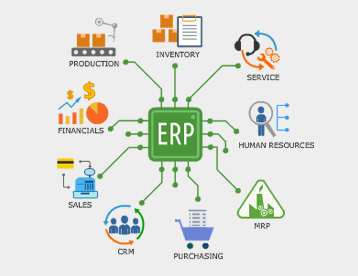The term ERP was coined by Gartner in the year 1990, but it has the source from the year 1960. In the year 1970, software engineers developed Material Requirements Planning (MRP) software to manage manufacture sectors. By years were passing manufacturing industries were grown then the situations demanded for new software to manage data along with Human Resource Management. Thus the demand leads to design ERP in the year 1990.
A Concise History of ERP
Introduction
ERP is a business process management system. It integrates all applications in the business process along with user interface. ERP is a type of enterprise application and it is intended to customize and analyze dada in large business process. There are also small business ERP applications that are used for limited business management process.
ERP Modules
ERP modules consist of planning, purchasing, inventory, accounting, development, sales and HR. ERP integrates all these modules in a business management process.
Based on the services and support, ERP system can divide into three tires.
- Tire 1: Solutions are specially designed for large companies with multiple continents.
- Tier 2: Solutions are made for mid-market business.
- Tier 3: Solutions are customized for small business clients and generally those businesses may not have multiple markets and branches.
Activities and Tasks of ERP Modules
ERP modules perform various activities and tasks like, standardization of critical business process, computerize the employee work-cycle, manage human resources and management, improve accuracy of data and facilitate better project planning.
ERP Solutions
ERP solutions are mainly used in manufacturing industry. Because, manufacturing industry consist of data from raw materials to selling and shipping. Hence, definitely a manufacturing industry requires ERP solutions. Whereas corporate companies require ERP solutions to manage employee details, payroll details, work time details, attendance maintenance and other information like training details.
Advantages of ERP Solutions
ERP solutions’ advantages are numerous. Some of the advantages can expect from White house business solutions the advantages are; helps to maintain data accurately, eliminates chaotic situations in the workplace, reduces manpower, works as a fast tracking reporter, reduces risk factor elements, cuts down the cost and increases data security.
Services of ERP
Customer Relationship Management (CRM), Human Resource Management (HRM), Supply Chain Management (SCM), CSM and time tracker these are the most important and widely using services of ERP. In White house business solutions, CSM and time tracker are developed to support companies.
Today’s ERP
Enterprise Market Resource Planning has expanded its roots to front-office functions. There are many manufacturing industries and corporate companies are enjoying the services of ERP solutions. Everything has digitized to reduce human efforts. So, markets are going behind smart services. White House Business Solutions is the place for smart service and support.

